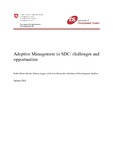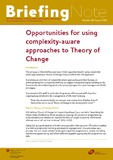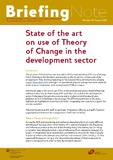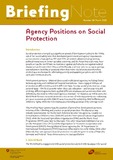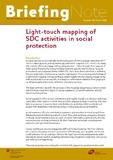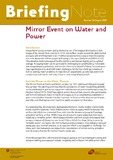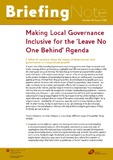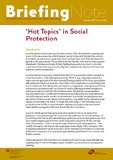Poverty, Politics, and Participatory Methodologies in SDC
Browse by
This Collaboration between the Institute of Development Studies (IDS) and the Quality Assurance (QA) Programme of the Swiss Agency for Development and Cooperation (SDC) is now in its second phase, running until June 2019. The aim of the program is to improve the quality and effectiveness of SDC processes and operations focused on poverty.
Recent Submissions
-
Donor Responses and Tools for Responding to Shrinking Space for Civil Society: a Desk Study
(Swiss Agency for Development and Cooperation (SDC), 2019-11)This report summarises and analyses donor responses to the closure of civic space around the world. It is part of a wider effort within the Swiss Agency for Development and Cooperation (SDC) to enable joint learning to ... -
Adaptive Management in SDC: Challenges and Opportunities
(Swiss Agency for Development and Cooperation (SDC), 2020-01)Adaptive management (AM) is a programme management approach that helps international development organisations to become more learning-oriented and more effective in addressing complex development challenges. AM practices ... -
Remote Monitoring in SDC: Challenges and Opportunities (Summary)
(Institute of Development Studies, 2019-07)This note provides a summary of a report (Briefing Note 10) prepared by the Humanitarian Learning Centre (HLC) for SDC in relation to an accompaniment on remote monitoring and remote management undertaken under the umbrella ... -
Remote Monitoring in SDC: Challenges and Opportunities
(Institute of Development Studies, 2019-07)Remote management and monitoring have increasingly become accepted and necessary modes of practice for many humanitarian and development actors working in fragile and conflict-affected areas, where security risks are ... -
Operationalising the Poverty Focus for Swiss Development Cooperation-Bangladesh
(Institute of Development Studies, 2019-02)This note provides a short guide on how the Swiss Agency for Development and Cooperation in Bangladesh (SDC-B) conceptualises, targets, monitors and measures poverty. It summarises the results of a 2016 exercise undertaken ... -
SDC Thematic Working Aid: Health
(Swiss Agency for Development and Cooperation (SDC), 2019)Since the publication of the 2004 World Development Report, there has been a growing recognition that decades of investments and action in global health have not led to equitable health gains for all (World Bank, 2003). ... -
SDC Thematic Working Aid: Employment & Income
(Swiss Agency for Development and Cooperation (SDC), 2019)There are 800 million people living below the international poverty line of US$1.90 a day. They are primarily rural (80 per cent), poorly educated (39 per cent lack formal education) and living in large households with ... -
SDC Thematic Working Aid: Education
(Swiss Agency for Development and Cooperation (SDC), 2019)Education is integral to the inclusive, peaceful and sustained development of a society. If education is equitable and of good quality, it can ensure the participation of marginalised groups in the development process more ... -
SDC Thematic Working Aid: Agriculture & Food Security
(Swiss Agency for Development and Cooperation (SDC), 2019)Agriculture remains a major source of livelihoods for the poor around the globe. Up to 800 million people and 78 percent of the poor live in rural areas and rely on agriculture to make a living. Agriculture is key to fight ... -
Opportunities for Using Complexity-Aware Approaches to Theory of Change
(Institute of Development Studies, 2018-08)The purpose of this briefing note is to review opportunities for using complexity aware approaches to Theory of Change (ToC) to inform the SDC approach. It provides an overview of complexity-aware approaches and then focuses ... -
State of the Art on Use of Theory of Change in the Development Sector
(Institute of Development Studies, 2018-08)The purpose of this briefing note is to add to SDC’s understanding of Theory of Change (ToC), drawing on the literature and practice to sketch out the current state of the art approach. This involves expanding on ToC ... -
Equity and Inclusion in Health Programming
(Institute of Development Studies, 2018-08)Equity and inclusion are key issues for the Swiss Agency for Development and Cooperation (SDC), given its strong commitment to the Agenda 2030 principle of “leaving no one behind” and to achieving Universal Health Coverage. ... -
Agency Positions on Social Protection
(Institute of Development Studies, 2016-03)Social protection emerged as a significant strand of development policy in the 1990s, out of the ‘social safety nets’ that dominated government and agency responses to socioeconomic crises such as HIV and AIDS, structural ... -
Light-Touch Mapping of SDC Activities in Social Protection
(Institute of Development Studies, 2016-03)Social protection is not explicitly mentioned as part of SDC’s strategic objectives 2017- 2020 or listed as a SDC priority theme (as outlined in ‘Dispatch 2017-2020’). Yet many SDC country offices do engage with social ... -
Mirror Event on Water and Power
(Institute of Development Studies, 2017-08)Inequality in access to water and sanitation is one of the biggest development challenges of the twenty-first century. In 2015, 663 million people around the globe lacked access to safe drinking water and 2.4 billion ... -
Making Local Governance Inclusive for the 'Leave No One Behind' Agenda
(Institute of Development Studies, 2018-08)A major aim of decentralised governance is to bring government closer to people and, in the process, deliver services in an equitable and efficient manner, in accordance with the expressed needs of citizens. The fact ... -
'Hot Topics' in Social Protection
(Institute of Development Studies, 2016-03)Social protection has become an inherent element of the development response and is one of the success stories of development policy in the early twenty-first century. It is widely considered to expand and remain an ...


